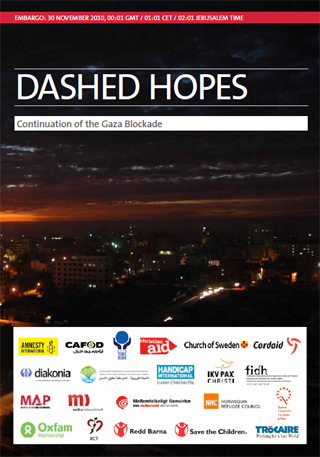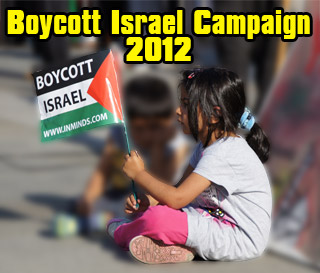
 Innovative Minds © 2014. All Rights Reserved. www.inminds.co.uk | ||||
Dashed Hopes - Continuation of the Gaza Blockadeinminds On 4th February 2011 the Lambeth and Wandsworth branch of PSC held a symposium on the recent report 'Dashed Hopes - Continuation of the Gaza Blockade' on the day to day logistics of the siege of Gaza. The study was conducted by 25 aid agencies over a 5 month period. 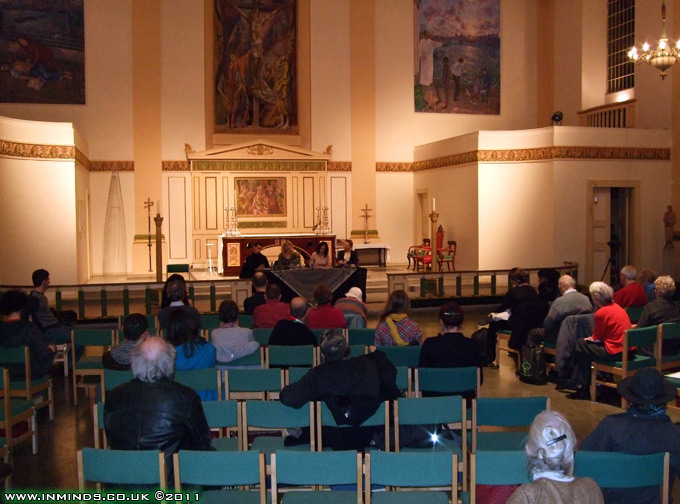 The symposium was held in St. Johns Church in Waterloo Maha Rahwanji, member of the Executive Committee of Palestine Solidarity Campaign, chaired the evening. Speakers included:
Each spoke for about 15 mins, followed by 30 minutes of questions and answers. Full video is provided below. Mohammed-Ali started by giving a brief history of the Gaza blockade. He then went through the finding of the report: only 20% of food is getting through the blockage compared to what used to enter Gaza. The UN determined that 68,000 home units need to be constructed for the people that were left homeless following Israel's 2008 'Operation Cast Lead' attack on Gaza, but only 11% of construction material is making it through the Israeli blockage - 715 truckloads a month compared to the required 670,000 truckloads. Having been born and raised in Gaza, Mohammed-Ali, gave personal insights of what the facts and figures in the report translate to for the ordinary people in Gaza: "Gazaans have to live with 10 hours electricity blackout everyday, which means you cant do anything for 10 hours.. Very few people have constant access to water, more than 60% of the Gaza population don't have such access - some only have access to water a few hours a week.. The Israeli government says we don't allow particular materials to come in to Gaza because it might be used for manufacturing weapons.. personally I don't understand how pasta can be used to manufacture a rocket". 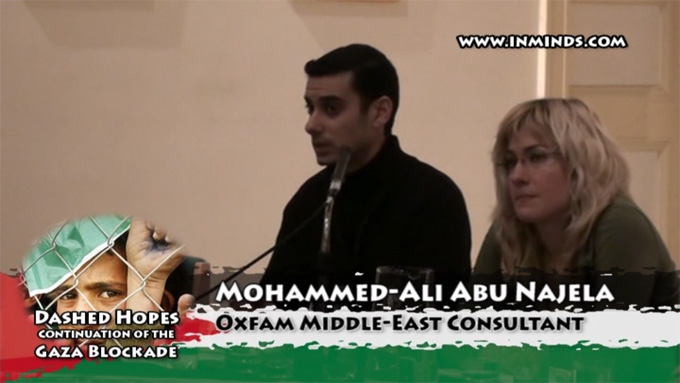 Mohammed-Ali Abu Najela, Oxfam Middle-East consultant Andrea Becker talked of the impact of the blockage on health. She started her talk by giving a brief history of MAP and explained that while its work was humanitarian they also do advocacy work informing as to the causes of the problem: "This is a manufactured crisis.. this is not an earthquake we are trying to clean up after, this is something that has been designed and is a result of policy". She explained that during Operation Cast Lead, clinics, and hospitals and ambulance paramedic teams were targeted. Due to the blockage, any one time you will have one hundred essential drugs that are missing. Water is a huge concern - 90% of the water in Gaza is considered undrinkable by the World Health Organisation.. We also have 80 million litres of partially treated or untreated sewage being pumped in the sea every day and also on to land. She explained that whiles the Israeli bombardments had lessened, there was never the less a "silent war" in every sector including health which was costing Palestinian lives. 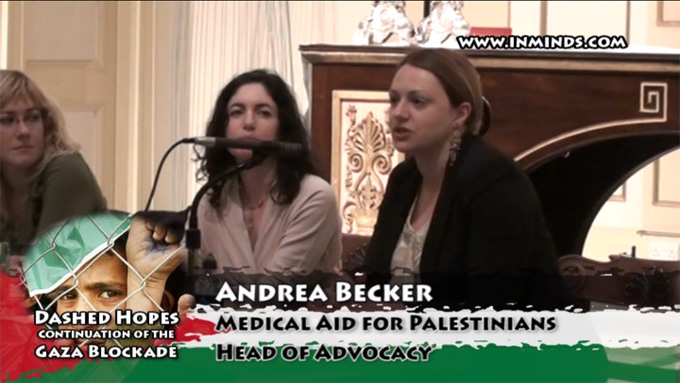 Andrea Becker, Head of Advocacy, Medical Aid for Palestinians Ewa Jasiewicz talked of the growing solidarity movement around the world with Palestine. She started with a brief history of the Free Gaza Movement which came out of the International Solidarity Movement (ISM). She talked of the campaign to delegitimize Israel by pointing to its human rights record over the past 60 years, and the Boycott Divestment campaign. She highlighted the importance of the cultural boycott on Israeli society: "babies burnt to death by white-phosphorous don't really make an impact on Israeli society - they justify that as necessary under a defence argument, but when the Pixies or the Gorillas or Vanessa Paradis and Johnny Depp decide not to come to Israel out of a political opposition to Israeli apartheid then that gets people asking questions.." 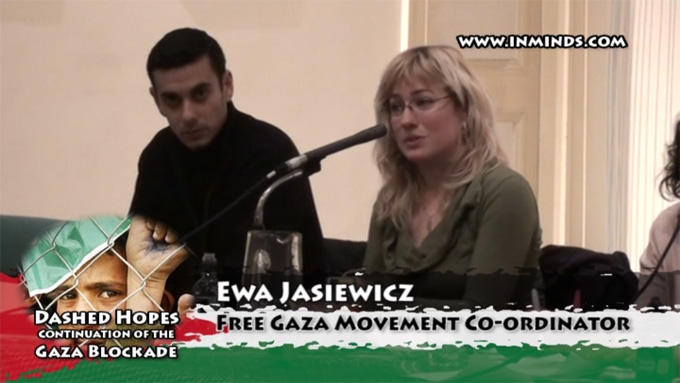 Ewa Jasiewicz, Co-ordinator for the Free Gaza Movement During the Question and Answer session when answering a question about Egypt and how it links to Palestine, Mohammed-Ali talked of the Rafah crossing "in 2007 I travelled outside of Gaza, going to France for training, when I came back I was stranded in a closed room in the airport for 60 days! Can you imagine that.. I came back from France to Cairo because I want to cross back to Gaza and they said no you don't have permission to go in to Egypt, I said okay I don't need to go in to Egypt I need transit to go in to Gaza. They said the Gaza crossing [Rafah] is closed you need to wait here. Everyday they said tomorrow, tomorrow.. I spend 60 days together with another 130 Palestinians together in a closed room [waiting].." 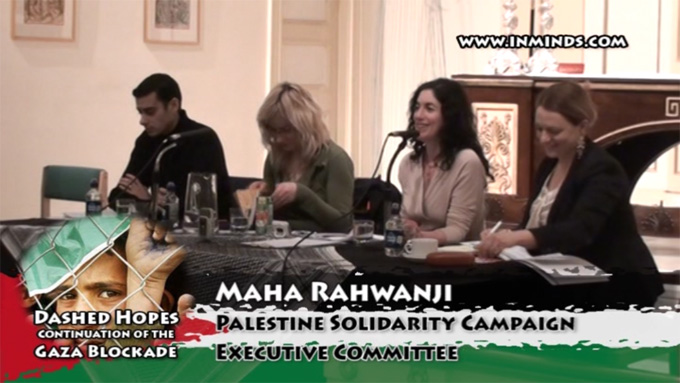 Maha Rahwanji, member of the Executive Committee of Palestine Solidarity Campaign Answering a question about Hamas Ewa Jasiewicz clarified any misconceptions: "what you were saying has the situation got worse because of what Hamas is going to Israel?.. If you classify having a political force that is not collaborating with Israel and denying Palestinian people the right of return, that is not compromising on the issue of settlements, that is refusing to crack down and murder political opponents, if that means what it is doing to Israel then yes that is what Hamas is doing to Israel, Hamas is not bowing to an Israeli stranglehold which as we have seen now very clearly with the Palestine Papers is exactly what the Palestinian Authority has been doing with American support, with CIA training, with complete Israeli co-operation and what many people have always refered to this as normalisation, is what the Palestinian Authority has been doing. Lets never forget that Hamas was voted to power not just in the Gaza Strip but also in the West Bank, this is always forgotten.." Video: Symposium on Dashed Hopes- Continuation of the Gaza BlockadeDuration: 1h 23min 0:00:00 Introduction 0:02:52 Mohammed-Ali Abu Najela 0:18:12 Andrea Becker 0:32:00 Ewa Jasiewicz 0:50:00 Question and Answer session Bruce Burgess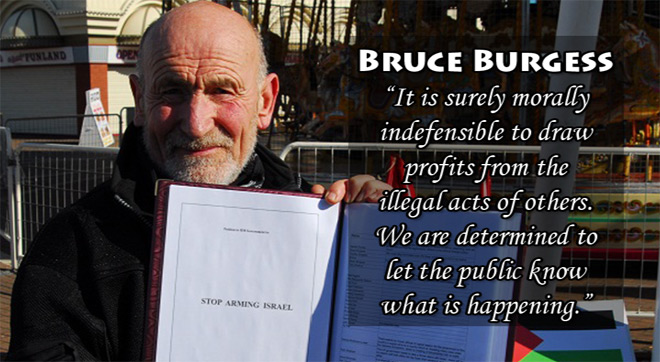 The symposium was dedicated to Bruce Burgess, who recently passed away. Bruce Burgess was an activist for the Palestinian cause, perhaps best known for the 'Ride for Palestine' event which he instigated. It entailed motorcyclists riding 220 miles from Southport to 10 Downing Street to deliver a petition demanding the government stop arming Israel. The quote above is from an interview Bruce Burgess gave to the Mecury Press in Liverpool on 16th August 2010: "The Ride for Palestine has had a very positive effect. It has raised awareness of our involvement in the actions of the Israeli army. We cannot escape being involved in their actions if we have supplied some of the means. The Ride will now probably become an annual event drawing attention to our complicity in different sectors. The one under active consideration for 2011 next year concerns the sale of goods in our supermarkets produced by illegal Israeli settlements. Whatever the exact legal position, it is surely morally indefensible to draw profits from the illegal acts of others. We are determined to let the public know what is happening." Source: inminds.com Also Of InterestPage URL: http://www.inminds.co.uk/article.php?id=10501
|
|
Support Us
If you agree with our work then please support us.Campaigns INMINDS Facebook Live Feed Latest Video's
INMINDS Twitter Feed Tweets by @InmindsComFeatured Video's
You need Flash player 8+ and JavaScript enabled to view this video.
[all videos (over 200)..] Featured MP3 Podcast 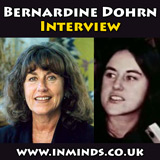 "You cannot simplify the question of violence.. You look at human history - the American revolution, the civil war, the end of slavery in the United States, the African National Congress, the end of colonialism - by and large these were some combination of popular social uprisings and social movements and non-violent protests AND armed resistance. Now that doesn't mean I'm advocating for any armed action today, I'm not. I'm committed to finding ways of acting and speaking and making people laugh and doing art and disrupting the war machine in other ways, but I think focusing on violence when we have the comfort of being protected by mass of armed violence is not non-violence at all.. if you are pointing to the mass of violence and who's doing the mass of violence in the world today, you have to look to state violence - that's people bombing whole cities from the air.. " A founder of the Weather Underground, a revolutionary group that waged war against the US government in the 70s in response to the Vietnam War. Interview, Radio Neatherlands (TSWI) 30 June 2007 [12min / 6Mb] [all podcasts..] Newsletter Feedback |
 |
 |
